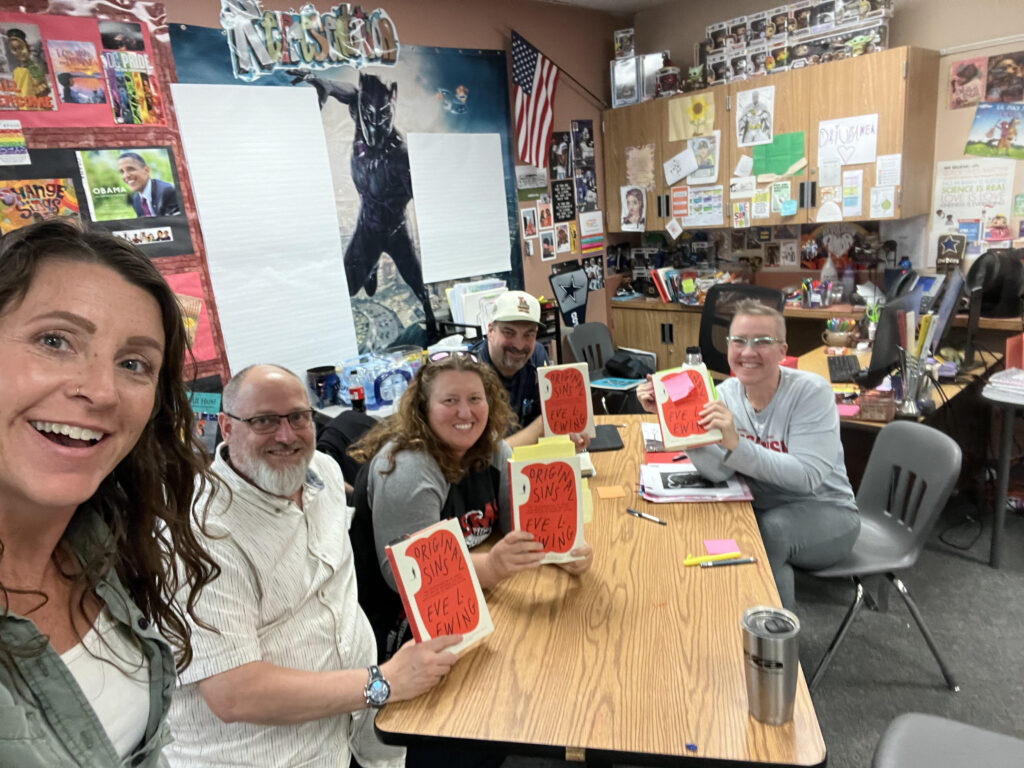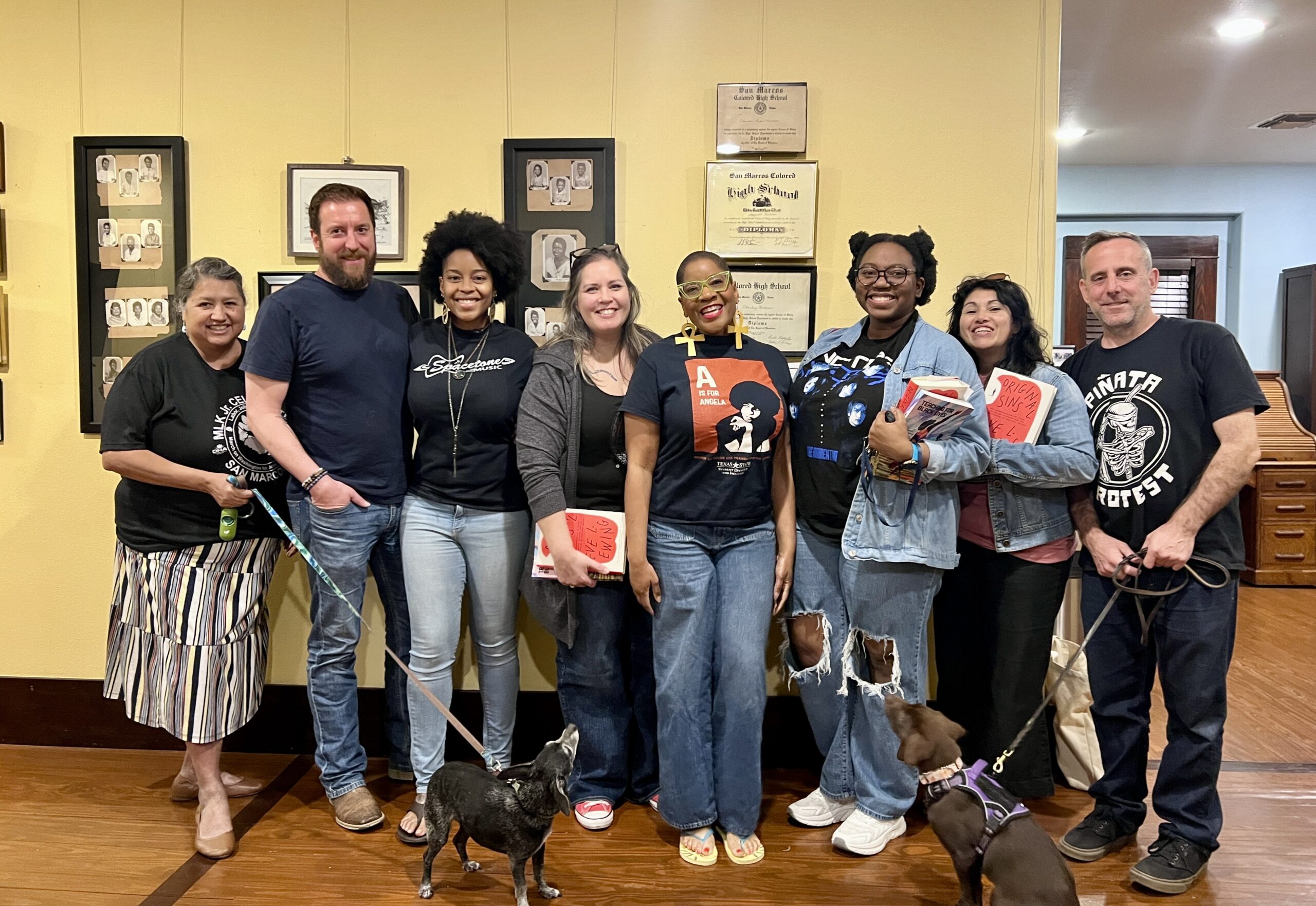
Teaching for Black Lives educators in Desert Hot Springs, California
Thanks to generous donors, the Zinn Education Project gave 450 copies of Eve Ewing’s Original Sins: The (Mis)Education of Black and Native Children and the Construction of American Racism to teachers, teacher educators, school librarians, and curriculum specialists.
Read below how Teaching for Black Lives study group participants are engaging with their copies of Original Sins.
California
Our Teaching for Black Lives study group at Desert Springs Middle School in Desert Hot Springs, California (pictured above) read Original Sins by Eve Ewing. The book illuminated the insidious ways white supremacy is embedded in educational systems, from military-derived structures to carceral models that prioritize compliance over inquiry. While we read the entire book, the two chapters that stood out to our book club were 4 and 5. Chapter 4 generated good discussion for us in California as my peers never realized or were not taught that many Mexican families are indigenous to California. One member said, I wish there was a book on people native to California. I told him, you are reading it, friend. But as many of us are transplants to California, we were not taught California history growing up. This led us to consider how we can infuse those lessons in our middle school classrooms with context on the author. In addition to that, another member had a difficult time reading about his hero, Thomas Jefferson. He mentioned that history paints heroic views of our ancestors without showing the harm of their actions. — Carrie Mattern, middle school English teacher, Desert Hot Springs
Florida
This book was amazing. Not only did it help me understand more to make sense of our reality today, but I already used content from it in a keynote presentation I delivered to pre-service teachers. Our book club participants also learned so much. One member said, “There were many times that I was able to read something that shifted paradigms for me.” I’d love to host another study group with this book. — Lorena German, teacher, Tampa
German created an Original Sins discussion guide for her teacher study groups.
Discussion Guide for Chapters 1–10
Chapter 1
First paragraph at the top of page 34:
a. Do you agree or disagree?
b. What evidence can you point to in your life that affirms or disputes this?
c. If school is a mirror, what is it reflecting to us now?
Chapter 2
Pages 56–57:
a. What are the fundamental problems here? How can we Biblically argue against any of this?
Chapter 3
Page 68–69, beginning at “Yet” and ending on “charity”:
a. Does this description affirm your own experiences with schooling?
b. Identify the underlying implications of Christian thought and values behind “White Lady Bountiful.”
Chapter 4
Pages 74–77:
a. Think about the language Ewing is using to respect their stories, communicate the truth of their lived experience, and reveal the evil in this history. What words do you notice that show respect, empathy, and truthfully assign blame?
Pages 90–91, beginning at “Parents” and ending on “alive or not”:
a. What words come to mind as you think of their plight and (hi)story?
Chapter 5
Quote on page 99: “Researches have documented the ways that students’ racial identities can drive teachers’ expectations of them and their sense of responsibility for student success.”
a. What questions arise for you?
At the bottom of page 101, we learn about a perspective in the Keresan Pueblo community.
a. What connections can you draw between this approach and the Bible?
Page 103, middle paragraph:
a. What do you think teacher qualifications should be? Why?
Chapter 6
Page 119, bottom paragraph:
a. What was mass/standardized testing like for you?
Pages 132–133 beginning with “Meanwhile” :
a. How would you summarize and explain the problem to someone not in the field of education?
Chapter 7
Page 135, beginning with “But as silly. . .” :
a. What information in this passage can you use to clarify your stance on standardized testing?
Chapter 8
Page 161, reflect on the phrase “Some kids need that.”
a. Do you agree or disagree with this approach? Explain your thinking.
Chapter 9
a. In the middle of page 167, Ewing offers us somewhat of an equation. “Settler colonialism requires disappearance, which in turn requires dehumanization; dehumanization requires “savages,” and savages require complete and unequivocal social control.” How, if at all, does this currently show itself in our society? Can you think of similar “equations” for other groups?
b. Discuss the impact of this chapter as it relates to collective trauma and religion.
Chapter 10
On page 199, Ewing names “psychological warfare” as the action done to Black and white students through “discipline” in schools.
a. What policies does Ewing cite that cause psychological warfare? What makes them warfare?
Georgia
We used excerpts from Original Sins in my intro to urban ed class and discussed the educational debt as well as the historical implications of racism and the U.S. education system. Combined with other readings in the course, this book was an excellent addition. I gave away the two extra books to my colleagues and encouraged them to incorporate the book or excerpts in their syllabus for the upcoming fall semester. — Chantee Earl, teacher educator, Atlanta
Iowa
Original Sins is already having an impact on our learning, mindsets, and teaching. Five members of our Teaching for Black Lives study group are reading the book so that we can brainstorm ways to use it with the full group. In our district’s curriculum, 6th graders learn about American Indian boarding schools, and Original Sins gives such full and honest context of how our country came to the idea of boarding schools. Our hope is that more teachers will engage with sections of this book to have a more complete picture when they are teaching the unit to students. Being able to dig into the book has already pushed me to learn and unlearn so much about education and its historical impacts in the United States. I plan to continue looking for excerpts to use in our study group. Thanks so much for the amazing donation to help educators continue their learning journey! — Haileigh Mejia, middle school teacher
Kansas
Reading and learning are necessary measures to becoming and being an antiracist educator. Ewing performs a feat with Original Sins, creating a space where those new and not-so new to radical reading can have precise language, like the school-prison nexus, to discuss the infectious problems of racism in education, as well as lean into antidotes.
We will be using Original Sins for our Teaching for Black Lives study group and holding a book club within SURJ–KC Ed (Showing Up for Racial Justice – Kansas City Education) as a follow up to our Teach Truth event in June. — Crystal Yakel-Kuntz, high school teacher, Kansas City
We established a book club with five staff members. After reading Original Sins we felt inspired to make our school a more responsive and compassionate place for our students of color. Specifically, we wanted to improve the way we interact with and educate immigrant students. Ultimately, we want all of our staff to better serve immigrant students from dozens of countries and countless situations, who otherwise can feel especially unwelcome, targeted, and criminalized. — Michael Rebne, high school teacher, Roeland Park
Texas
Teacher educator Skyller Walkes and colleagues in San Marcos, Texas, were thrilled to receive complimentary copies of Original Sins. In 2025, they formed a Teaching for Black Lives study group of eleven educators from San Marcos’ elementary schools, high schools, and state university. They met monthly at the Calaboose African American History Museum’s Cephas House.

Washington
Original Sins was a critical read for both myself and leaders in our district. Copies were shared with teacher leaders and they continue to be circulated. As we center racial justice work, it is necessary to deepen our understanding of the history behind the injustices we still see in school systems.— Kirsten Jensen, instructional coach, Bellingham

